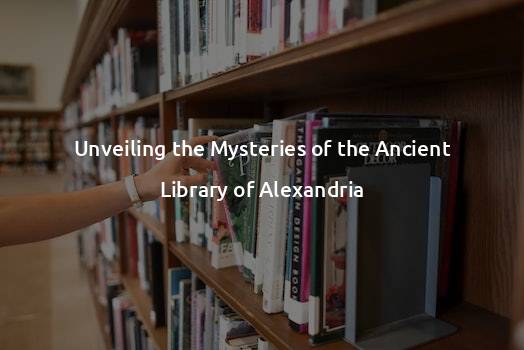Unveiling the Mysteries of the Ancient Library of Alexandria
The Ancient Library of Alexandria has long intrigued historians, archaeologists, and book-lovers alike. This magnificent library, located in the Egyptian city of Alexandria, is often shrouded in mystery, with many unanswered questions about its construction, contents, and ultimate fate. Join us on a journey to unveil the mysteries of this lost treasure and delve into the rich history of one of the most significant libraries in the ancient world.
The Library of Alexandria was built during the reign of Ptolemy I Soter, one of Alexander the Great’s most trusted generals, in the 3rd century BCE. It quickly became a center of learning, attracting scholars and philosophers from all around the Mediterranean. The library was more than just a collection of books; it was a vibrant hub of knowledge, dedicated to the pursuit of wisdom and intellectual enlightenment.
Its construction was a marvel in itself, reflecting the grandeur and ambition of the Ptolemaic dynasty. The library stood within the Mouseion, a sprawling complex that included lecture halls, gardens, and study rooms. The main library building housed an estimated 400,000 scrolls, making it the largest and most comprehensive library of its time.
A question that has puzzled historians for centuries is the actual location of the library. While there is no definitive answer, most evidence points to its proximity to the royal palace and the Great Harbor of Alexandria. The library was likely spread across multiple buildings within the Mouseion complex, making it an architectural labyrinth. Unfortunately, the passage of time and numerous conflicts in Alexandria have made it challenging to pinpoint the exact location of the library.
The contents of the Library of Alexandria were as diverse as they were extensive. The scrolls housed within its walls covered a wide range of subjects, including literature, science, mathematics, history, medicine, and philosophy. It is believed that renowned scholars such as Euclid, Hipparchus, and Eratosthenes contributed to the collection, ensuring the library’s reputation as a beacon of knowledge and wisdom.
Tragically, the fate of the Library of Alexandria is tinged with mystery and controversy. Its destruction is often attributed to a catastrophic fire, with several episodes throughout history being cited as possible causes. The most commonly cited incident is the fire set by Julius Caesar’s troops during his occupation of Alexandria in 48 BCE. Although the main library building may have been destroyed during this event, it is believed that a smaller library, the Serapeum, continued to function for several centuries.
Another theory suggests that the library’s demise was a gradual process, resulting from neglect, decline, and intermittent acts of violence during the subsequent Roman and Byzantine periods. The advent of Christianity also posed a threat to the library, with certain Christian leaders deeming its contents as heretical or unnecessary. Whatever the precise cause, it is generally accepted that the Library of Alexandria ceased to exist by the end of the 4th century CE.
The loss of the Library of Alexandria is, undoubtedly, one of the greatest tragedies in the history of knowledge. Its destruction not only resulted in the loss of countless unique and irreplaceable texts but also dealt a significant blow to the intellectual and cultural heritage of the ancient world.
Nevertheless, the legacy of the Ancient Library of Alexandria lives on. Its influence is still felt in the modern world, as the concept of a vast, accessible repository of knowledge continues to inspire libraries and educational institutions worldwide. The efforts to recreate and reestablish this grand institution may never fully succeed, but the spirit of the Library of Alexandria continues to fuel the collective desire for knowledge and the pursuit of wisdom.
In conclusion, the Ancient Library of Alexandria remains a source of fascination and mystery, with many secrets yet to be unveiled. From its awe-inspiring construction to its vast collection of scrolls, this institution represented the pinnacle of intellectual achievement in the ancient world. While its ultimate fate may be clouded in uncertainty, the enduring impact of the Library of Alexandria serves as a testament to the power of knowledge and the pursuit of wisdom.
TLDR; The Ancient Library of Alexandria, built in the 3rd century BCE, was a remarkable center of learning and knowledge. It housed an extensive collection of scrolls covering various disciplines, attracting scholars from all around the Mediterranean. Despite its eventual destruction, the library’s influence can still be felt today, as it continues to inspire the pursuit of knowledge and wisdom. The mysteries surrounding its location and demise only add to its allure, making it a captivating chapter in the history of mankind’s intellectual heritage.







